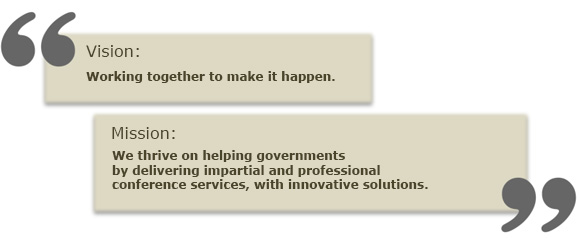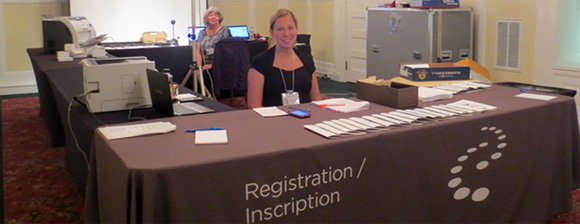
Publication
Strategic Plan 2015-2020
TABLE OF CONTENTS
- MESSAGE FROM THE SECRETARY
- ORGANIZATIONAL OVERVIEW
- OUR WORK ENVIRONMENT
- STRATEGIC POSITIONING
- STRATEGIC PRIORITIES FOR 2015-20
MESSAGE FROM THE SECRETARY
 The Canadian Intergovernmental Conference Secretariat (CICS) is fully committed to evolving alongside the changing needs of our clients. As our environment continues to evolve, our focus continues to be, and must remain, excellence in delivering quality, cost-effective services to senior-level intergovernmental conferences.
The Canadian Intergovernmental Conference Secretariat (CICS) is fully committed to evolving alongside the changing needs of our clients. As our environment continues to evolve, our focus continues to be, and must remain, excellence in delivering quality, cost-effective services to senior-level intergovernmental conferences.
Over the next five years, the Secretariat’s priorities will continue to be that of: enhancing and expanding strategic partnerships; transforming our service delivery model; reviewing and adapting management practices to increase efficiencies; and continuing to build a capable, confident and high performing workforce.
The following strategic plan provides an overview of the Secretariat and its mandate, analyzes our current environment and details our strategic priorities and objectives.
André M. McArdle,
Secretary
ORGANIZATIONAL OVERVIEW
Who We Are
The Canadian Intergovernmental Conference Secretariat (CICS) is a hybrid and impartial agency whose mandate is to provide administrative support and planning services for intergovernmental conferences of first ministers, ministers and deputy ministers, throughout Canada.
Even though CICS was designated as a department of the federal government a few months after it was established, pursuant to an agreement reached at the May 1973 First Ministers’ Conference, its intergovernmental character and impartiality are guaranteed by the fact that it is funded by the federal and provincial governments. CICS staff also includes public servants from federal, provincial and territorial (F/P/T) governments.
The Secretary reports to all governments annually. As well, CICS reports to Parliament through the President of the Queen’s Privy Council for Canada.


Our Values

OUR WORK ENVIRONMENT
Federal Government
2015 marks an important year; the current administration’s priority of returning to a balanced budget has materialized. As such, the reductions in place over the last five years have now been almost fully absorbed by departments and agencies. Cost containment measures such as the Operational Budget Freeze and the Directive on Travel, Hospitality, Conference and Event Expenditures are ever present. Therefore we continue to serve a large number of conferences held in the National Capital Region and Toronto.
Typically, in a given year, our peak period of conferences runs from June-July and September-October, respectively. The expected federal election to be held in the fall has advanced many of the fall meetings to the summer. As a result, CICS has been fully booked for the summer months and, unfortunately, has had to turn away a few requests for services. Even though conference activity for the fall is much lower than usual, we anticipate that intergovernmental meetings across all sectors will resume come winter.
Back in 2013, the Federal Government launched a process of modernization and renewal – Blueprint 2020 – aimed at transforming the government for success in the 21st century. The needs of our clients were changing prior to the launch of this government-wide initiative. As such, CICS had been proactive in evaluating and implementing efficient and innovative conference solutions that helped contain costs. We are currently experiencing an increase in requests for video-conferencing at face-to-face meetings and there is a growing demand for virtual tele-conferences and virtual video-conferences.
A back-office transformation is currently taking place across the federal public service and will continue over the next few years. Among others, HR and Financial systems are being consolidated to increase efficiencies. CICS was one of the first organizations to onboard the new HR system and will soon be integrating the compensation component.
Another priority area identified by the Clerk of the Privy Council is to reinvigorate recruitment efforts. The Public Service Commission is committed to streamlining the staffing process to better meet the needs of organizations. This will have a positive impact on CICS because as a small agency, even one vacancy has a significant impact on our business.
Security is a prevalent topic in the current environment. Whether physical or IT-related, the culture is one of hyper-awareness. Security is embedded into CICS policy frameworks, day-to-day operations and employee behaviours. The Secretariat will continue to ensure that security mechanisms and resources are planned, efficient and effective, as well as in line with government policies.
Provincial, Territorial (P/T) Governments
Provincial and Territorial (P/T) governments continue to meet regularly across all sectors. CICS was up by 13 conferences from the previous year in 2013-14 and in 2014-15 we closed with a further increase of 12 conferences. Despite this growth in conference activity, it also continues to be a time of fiscal restraint for the provinces and territories and these realities do have an impact on CICS. For instance, we served our first virtual video-conference as well as 19 virtual teleconferences in 2014-15 compared to only 3 virtual teleconferences in 2013-14. As with the federal government, P/T governments are modernizing, seeking efficiencies wherever possible, reducing travel and exploring the use of new technologies. CICS is happy to continue to offer a wide array of conference solutions that respond to these needs.
Due to the expected October 2015 federal election, a few of the P/T elections scheduled for 2015 were deferred to 2016. Prince Edward Island and Alberta underwent their general elections in May 2015. Newfoundland and Labrador is anticipating an election on November 30, followed by three jurisdictions in 2016, one in 2017 and five in 2018. As new governments come in to power and others are re-elected, it is important for us to actively market CICS as a neutral intergovernmental agency. Communications efforts should be ongoing in order to sustain and even increase the number of intergovernmental conferences we serve.
Our Strengths
- We employ a dedicated and professional workforce comprising of F/P/T employees;
- We uphold a strong and positive reputation as being the service provider of choice;
- We maintain a tradition of excellence;
- We have a solid corporate system;
- We uphold a unique collection of documents in our archives;
- We offer a broad array of IT tools/services to our clients;
- We offer cost-efficiencies (shared services);
- We serve virtually all sectors of intergovernmental activity;
- We are flexible. As a micro agency we have the ability to make decisions, adapt and implement change quickly;
- We are well connected with other small agencies and the Central Agencies;
- We are in line with government priorities (transformation taking place).

Intergovernmental Environment
CICS continues to co-host an annual ‘Knowledge Exchange Forum on F/P/T Meeting Logistics’. The goal of these informal gatherings is to provide our federal government contacts with an opportunity to network and exchange information as new people join departments and everyone deals with the new realities surrounding the organization of senior level F/P/T meetings. The scope was recently expanded to allow for working groups composed of our clients to work on projects targeted at developing future initiatives and services.
On the provincial side, CICS reached out to Prince Edward Island government officials in January 2014 to assist them with coordinating efforts for the large number of FPT conferences they would be hosting in 2014 in conjunction with the 150th celebration of the Charlottetown conference. Site visits to the various venues were conducted together and opportunities for working across sectors to find efficiencies were identified. This collaborative effort proved highly successful and CICS would be delighted to work with any jurisdiction on similar projects.
Our Challenges
- Anticipating further Budget constraints;
- Managing a number of key personnel departures due to retirements;
- Sustaining a secure environment both in the office and on conference site (physical threats, internal and external hacking);
- Increasing requirements from central agencies (reporting burden, changing policies, additional demands) and insufficient resources;
- Maintaining our intergovernmental impartial focus;
- Managing the change process in light of the high number of priorities (implementing, prioritizing, dealing with obstacles);
- Obtaining services in a shared services environment.
New Sector
Since last year’s plan, CICS has provided its services to one new sector, Election Officials.
Our Employees
In the next few years, eleven of the Secretariat’s federal public servants will be eligible to retire. These retirements, the P/T secondment rotations and the outcome of current labour negotiations may affect CICS’s ability to sustain an adequate workforce with the appropriate competencies. Developing meaningful succession and transition plans which include conserving corporate memory will continue to be a critical strategic priority. In addition, CICS will take the opportunity to enhance and modernize archival holdings, have experienced personnel mentor new employees and offer departing employees alternative work arrangements to help stagger departure dates and lessen the impact of staff turnover.
Retention of young, ambitious and newer staff creates a unique challenge for a micro agency such as CICS due to its limited upward mobility. Sustained efforts will be exerted to keep employees for a reasonable period of time by creating an environment conducive to career development and job satisfaction.
CICS is proud to offer its employees flexible work arrangements, many employees are taking advantage of compressed work weeks, telework arrangements and leave with income averaging. Feedback thus far has been positive as it allows employees to achieve better work-life balance.

STRATEGIC POSITIONING
Human Resources Priorities
CICS’ human resources priorities for 2015-2020 are the following:
- Have a fully staffed core workforce to meet the CICS vision, mandate and strategic priorities.
- Conserve at least six provincial/territorial positions, as they represent an integral part of our organization.
- To meet the cyclical demand for conference services, complement human resource requirements by using short term employment.
- Review and update our Succession Plan for key positions.
Investing in our Employees
CICS’s employees – not just federal, but provincial and territorial as well – constitute the organization’s greatest asset in terms of accomplishing its primary mission.
Their commitment is absolutely essential when it comes to successfully navigating certain changes.
Learning, training and development are important priorities for CICS and we will continue to invest in compulsory as well as corporate training sessions to assist employees to build their capacities.
Servicing Conferences
 The mandate at CICS has been interpreted over the years in such a way as to ensure consistency across all sectors we serve, to guarantee the quality of our service, to control costs and to ensure the long-term functioning of the Secretariat as a key partner at intergovernmental meetings. These interpretations consisted of offering a minimum “package” deal of services with a series of standards such as defining a meeting as “face-to-face” with at least a quorum of Ministers or Deputy Ministers in attendance, limiting translation to official conference documents, and obtaining rooms 24 hours in advance for set-up, among other things.
The mandate at CICS has been interpreted over the years in such a way as to ensure consistency across all sectors we serve, to guarantee the quality of our service, to control costs and to ensure the long-term functioning of the Secretariat as a key partner at intergovernmental meetings. These interpretations consisted of offering a minimum “package” deal of services with a series of standards such as defining a meeting as “face-to-face” with at least a quorum of Ministers or Deputy Ministers in attendance, limiting translation to official conference documents, and obtaining rooms 24 hours in advance for set-up, among other things.
With the changing nature of intergovernmental meetings, the introduction of facilitating technologies, the initiative put forward by the Clerk to find more efficient ways to meet and the fiscal pressures experienced by all levels of government, CICS has decided to refine the interpretation of its mandate.
Service offerings will be expanded, opening the door to a variety of models and types of services to support the transformation of intergovernmental collaboration.
Corporate ManagementBudget pressures and cost containment measures will be ever present in the management of CICS. The Secretariat will maintain its leadership role with other small agencies in order to achieve our goal of reducing back office costs. Over the last two years our agency has made tremendous progress in managing and controlling resources. Momentum must not be lost as we have the responsibility to continuously improve upon efficiencies. Keeping in mind the neutral intergovernmental nature of the agency, CICS Management will fulfill its obligation as an agency of the federal government by:
|
|
Information Management
CICS is a neutral federal agency that is subject to the FAA and therefore must adhere to the Policy on Information Management. Although CICS is exempt from the Access to Information Act, we respect the spirit of the act in our practices. The requirements of the policy are complex while stringent for a small organization especially considering our resources and the diversity of our collection.
CICS recognizes the importance of proper information management throughout the organization for both its corporate holdings and its intergovernmental conference documents. Efforts and resources will be focused to ensure electronic systems are the preferred means of creating, using and managing information.
Technology
As an integral partner in facilitating F/P/T meetings, we have the responsibility to respond to client and environmental demands. The current transformation of intergovernmental business is concentrating on investments in technology in order to be efficient and outcome driven.
CICS will make its technology decisions based on the needs of a mobile workforce and in alignment with government-wide initiatives.
In addition, CICS will proactively keep abreast of new technologies and their potential application in for service delivery.
Security
Although CICS manages its security effectively, there is a constant need to review and refine internal practices in order to be in line with the government’s direction. By doing so, the agency will be better positioned to deal with current and future threats.
Security is embedded into CICS policy frameworks, culture, day-to-day operations and employee behaviours.
Management will ensure that security mechanisms and resources are planned, efficient and effective, as well as in line with government policies.
STRATEGIC PRIORITIES FOR 2015-20
Following a recent strategic planning session conducted by senior management, it was decided to continue applying the following four strategic priorities over the next five years:
- Enhance and expand strategic partnerships
- Transform our service delivery model
- Review and adapt management practices to increase efficiencies
- Continue to build a capable, confident and high performing workforce

Priority 1 Enhance and expand strategic partnerships
 Since its creation, CICS has been able to rely on a well-established clientele made up of the various governments. In the interest of validating its mandate, CICS plans to enhance current partnerships by improving dialogue, assessing service offerings and evaluating client feedback. CICS is also planning on developing new and existing strategic partnerships by implementing new marketing initiatives
Since its creation, CICS has been able to rely on a well-established clientele made up of the various governments. In the interest of validating its mandate, CICS plans to enhance current partnerships by improving dialogue, assessing service offerings and evaluating client feedback. CICS is also planning on developing new and existing strategic partnerships by implementing new marketing initiatives
Objectives are as follows:
- Recognition among governments of the essential, constructive role played by the Secretariat through improved dialogue and greater collaboration;
- Market CICS and its services effectively;
- Maintain the existing clientele and explore new partnerships to attain maximum capacity; and
- Enhance relationship with Central Agencies.
Priority 2 Transform our service delivery model
To become more efficient and find alternatives in order to maintain quality services at a time of fiscal restraint, the organization will continue to invest in new technologies, not only for its day-to-day management, but also for the delivery of its services.
Objectives are as follows:
- Continuous improvement in the service delivery model by aligning people, processes and technologies to reflect the current environment, the demands of the future and the changing needs of clients; and
- Efficient information management of conference records (i.e. preservation, digitization, de-classification, and disposal).
Priority 3 Review and adapt management practices to increase efficiencies
Although legally CICS is a federal agency, it is funded by the two levels of government (federal and provincial). The current context of fiscal austerity and budget reductions means that CICS will continue to pay special attention to its management practices. It will need to identify measures offering a better cost/benefit ratio in everyday operations, such as the organization of conferences and the allocation of our resources internally. There is also a need to measure the estimated costs of the changes that CICS wants to make, particularly in terms of the greater reliance on technology.
Moving ahead with sound management practices requires employee cooperation and engagement in order to maintain and even strengthen their commitment to the organization.
|
Objectives are as follows:
|
 |
Priority 4 Continue to build a capable, confident and high performing workforce
The Secretariat’s greatest asset remains its personnel. This priority focuses on seeking ways to empower and motivate employees, build internal capacity, and provide flexible means of working.
It also includes modern workplaces that support teamwork and encourage productivity in a supportive environment, to meet and exceed performance expectations without compromising personal lives or health outcomes.
CICS will continue to invest in the well-being of its employees as well as in their training, on both an individual and corporate level.
Objectives are as follows:
- Collectively be proud of the place CICS plays within the Canadian federation, and of the value and benefit of the work we do;
- Work collaboratively toward the same vision for CICS;
- Promote a values-based, positive and healthy working environment;
- Foster employee engagement in initiatives;
- Ensure open and ongoing communications;
- Recognize employee efforts; and
- Foster a culture of continual improvement and innovation.
